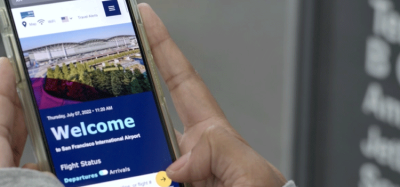Lessons learned from an airport CEO
- Like
- Digg
- Del
- Tumblr
- VKontakte
- Buffer
- Love This
- Odnoklassniki
- Meneame
- Blogger
- Amazon
- Yahoo Mail
- Gmail
- AOL
- Newsvine
- HackerNews
- Evernote
- MySpace
- Mail.ru
- Viadeo
- Line
- Comments
- Yummly
- SMS
- Viber
- Telegram
- Subscribe
- Skype
- Facebook Messenger
- Kakao
- LiveJournal
- Yammer
- Edgar
- Fintel
- Mix
- Instapaper
- Copy Link
Posted: 23 August 2022 | Holly Miles, Mohamed Albinfalah | No comments yet
International Airport Review Editor, Holly Miles, sat down with Bahrain International Airport CEO, Mohamed Albinfalah, to examine how things are going for the airport, his lessons learned from the pandemic and the exciting developments that are in store for the future.
The new terminal at Bahrain International Airport (BAH) was in the final phase of construction when the coronavirus pandemic hit. Despite this turn of events, the airport was able to go live with its new terminal on 28 January 2021 with the airport being named ‘World’s Best New Airport’ by Skytrax 2022 World Airport Awards. Bahrain Airport is not unique in finding a spanner in the works due to the onset of COVID-19, but it has given them a lot to think about.
When asked about his lessons learned from the pandemic, Albinfalah said that there were two things, firstly taking a risk-based management system to deal with a crisis like this, and secondly, harmonisation throughout the industry: “Precautionary measures that came about during the pandemic did not work well with terminal capacities, for example social distancing. No airport was able to add additional capacity to accommodate these new rules. Not to mention the irony of trying to socially distance in the airport and then boarding a flight where the seats are right next to each other, which created unease.
We need to answer some tough questions and question why people have left the industry and why they are not interested in coming back”
“Our second lesson learned is harmonising our protocols. One of the biggest setbacks to the whole industry was the various protocols being implemented around the globe. As we, as an industry, are highly integrated, one disruption at one point can have a ripple effect across the full supply chain. We cannot afford to go through the same experience again, which is why I think we should urge ACI, IATA and ICAO to seriously look into the harmonisation of protocol for this type of crisis.”
Agility and resilience
When passenger numbers went off a cliff edge, airports realised that they need to be able to scale their operations up and down at short notice to minimise losses. One of the key points that Albinfalah has taken from the pandemic is that they need to look critically at the way they have been running the airport.
“We have identified organisational optimisation as a key focus area for positive change. Another high impact area will be passenger experience and the relevancy of digital solutions such as contactless or single token solutions, which are on the agenda for the airport. We will be carrying out a proof‑of‑concept project. We’ve just signed up with one of the technology providers and they are mobilising to start testing to see how passengers will react, as well as whether airlines will embrace it.”
We cannot afford to go through the same experience again, which is why I think we should urge ACI, IATA and ICAO to seriously look into the harmonisation of protocol for this type of crisis”
As well as agile operations, airports must also look to bolster their non-aeronautical activity, and for Bahrain International Airport, cargo became an area of strategical importance.
“We just broke ground into a new cargo facility, the Express Cargo Village. We have sold a major part of it to one of the main major cargo operators, and the contractor should start work within a week or so. So, that is strategically one of our focus areas on the non-aeronautical front,” explained Albinfalah.
The Express Cargo Village will increase BIA’s cargo capacity in line with the highest standards, deploying advanced technologies to improve efficiency and meet growth targets for air freight and e-commerce.
Stretching over an area of 25,000 square metres, the Express Cargo Village at BIA is an advanced logistics hub, which includes buildings dedicated to serving each cargo operator in line with the highest international standards. It ensures that all operations are carried out quickly and smoothly in a single location, enabling the airport to handle larger quantities of cargo efficiently, better meet the requirements of cargo customers, and create new job opportunities.
Bahrain Airport Company has signed a 10‑year agreement with global logistics giant, FedEx Express, allocating 9,000 square metres to it for the operation of a 5,000 square metre warehouse and a 4,000 square metre open area, which will be handed over in the third quarter of 2023.
Sustainability commitments
The Kingdom of Bahrain made a commitment at the COP26 conference in Glasgow to reach net zero carbon by the year 2060.
“We believe that it is quite an ambitious endeavour. We need to do our best to be a positive contributor. We have been a member of the ACI Airport Carbon Accreditation programme. We have reached level three and we are moving it to level four. We have identified renewable energy projects at the airport that we believe will do two things. It will achieve some of the net zero carbon targets at a national level, but it’ll also reduce some of our cost when it comes to national grid power supply,” added Albinfalah.
A new private terminal
The airport has also launched a new private terminal in what served as the Kingdom’s first international airport in the 1960s, converting the historic building into a private terminal. Today it caters for the private jet passenger, as well as VIPs. The project represents a major upgrade in the level of services provided at the airport and will play a vital role in the achievement of Bahrain’s Economic Vision 2030 goals.
Spanning 4,000 square meters, the Awal Private Terminal offers a range of services to enhance the travel experience for private aircraft owners, VIPs, and business leaders such as private and public halls and meeting rooms, as well as private parking spaces offering direct access to the terminal. The terminal also has duty-free shops that are designed to meet the needs of VIPs; dedicated facilities for immigration, customs, and baggage handling; and parking for visitors.
“This is just one exciting product that we are trying to promote among not only the passengers of Bahrain, but also throughout the catchment area for Bahrain International,” said Albinfalah.
Looking ahead
Currently capacity constraints for airlines are a challenge and Albinfalah explains that they are seeing a lot of cancellation and rescheduling. It is the same story on the ground with some of their stakeholders, such as ground handlers, who do not have the capacity to meet the demand.
The way the industry responded to the pandemic created a lot of uncertainty and undermined the sector as a stable employer, so those who left are hesitant to come back says Albinfalah: “It will take time, because you cannot recruit fully experienced and fully trained staff at short notice. We need to answer some tough questions and question why people have left the industry and why they are not interested in coming back.”
During the first year of the pandemic in 2020, the airport lost 76 per cent of its 9.7 million passengers. However, owing to their status as a transfer company, the airport saw a positive recovery in 2021. This year they are forecasting between five and six million passengers and they hope to be back to 2019 levels by end of next year.
When asked if he is positive about the future, Albinfalah replied: “I think we are an industry that has proven itself to be very resilient. The pandemic has set back some of the plans many of us had, but I think now we are on positive trajectory to recover. I think if we can focus on the capacity challenges that parts of the industry are facing, I think 2023 and 2024 will be very positive years for the aviation industry.”


Issue
Related topics
Airport leadership, Cargo, Contactless / Touchless technology, COVID-19, Passenger experience and seamless travel, Passenger volumes, Workforce


















